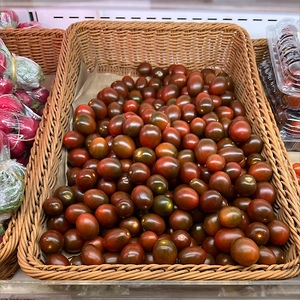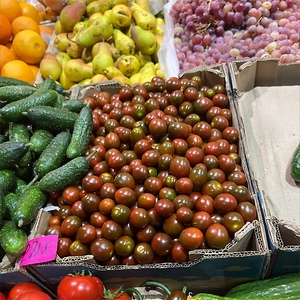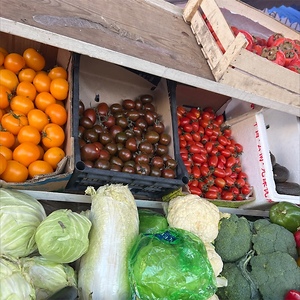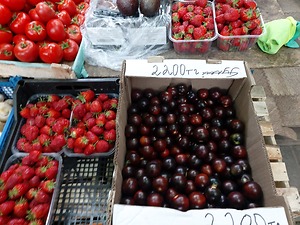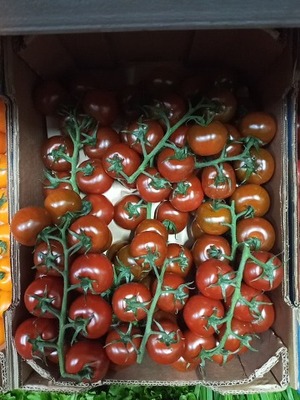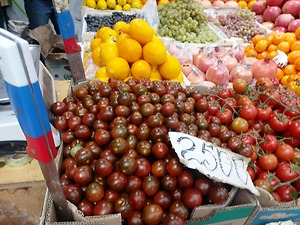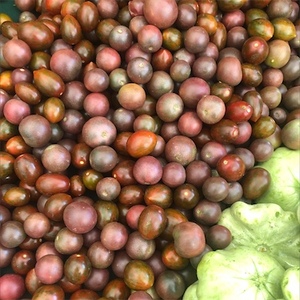

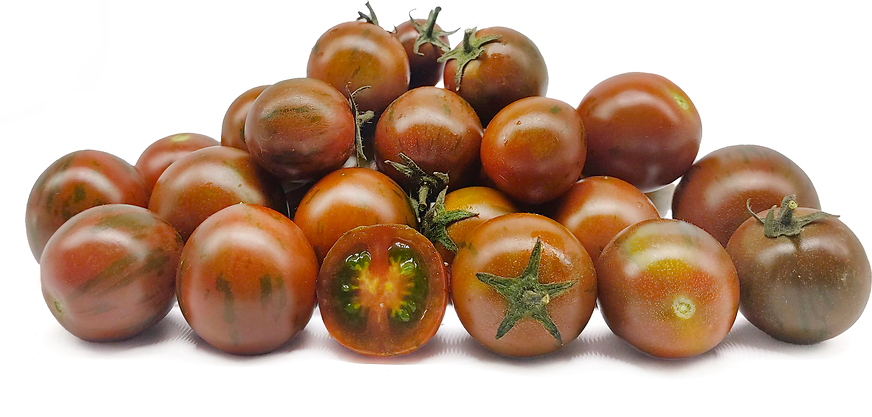
Black Prince Cherry Tomatoes
Estimated Inventory, 1 Lb : 0
Description/Taste
Black Prince cherry tomatoes are small fruits, averaging 3 to 5 centimeters in diameter, and have a round to oval shape growing in clusters along slender green vines. The skin is smooth, thin, taut, and glossy, showcasing variegated hues of dark red, mahogany-brown, and faint green striping. Underneath the surface, the flesh also contains multiple green and red shades and has an aqueous, firm, and dense consistency, encasing gelatinous chambers filled with small, flat, and oval seeds. Black Prince cherry tomatoes have a fruity aroma and are low in acidity, developing rich, sweet, and tangy flavors with subtle salty, sour notes.
Seasons/Availability
Black Prince cherry tomatoes, when cultivated outside, are available in the summer through early fall. When grown in greenhouses, the variety is available year-round.
Current Facts
Black Prince cherry tomatoes, botanically classified as Solanum lycopersicum, are an early-maturing, sweet variety belonging to the Solanaceae or nightshade family. The small tomatoes are considered an all-purpose cultivar that can be utilized in both fresh and cooked culinary preparations and are popularly grown in home gardens throughout Central Asia and Russia. Black Prince cherry tomatoes were selected for their unique coloring, productive nature, and small size and were created from multiple years of natural crossbreeding between cultivated and wild tomato varieties. The cherry tomato cultivar is also highly favored for its adaptability to colder climates, and the fruits ripen in whole bunches for an easier harvest. Black Prince cherry tomatoes are a part of a larger grouping of tomato varieties labeled generally as black or brown tomatoes. These tomato cultivars are known for their unique, dark coloring, and the purple, black, and brown hues are developed from the presence of anthocyanins.
Nutritional Value
Black Prince cherry tomatoes are an excellent source of vitamins A and C, nutrients that strengthen the immune system, maintain eye health, and reduce inflammation. The tomatoes also contain potassium to balance fluid levels within the body, lycopene, an antioxidant that contributes to heart health, and anthocyanins, pigments found in the skin and flesh that contain antioxidant-like properties to protect cells from external environmental damage.
Applications
Black Prince cherry tomatoes are a versatile variety with a sweet, subtly sour flavor showcased when consumed fresh or cooked. The small tomatoes can be sliced in half and tossed into salads, chopped into salsas, cut and mixed with herbs as a topping for crusty bread, pureed and made into a juice, or sliced and layered on sandwiches. Black Prince cherry tomatoes can also be simmered into savory sauces for pizza and pasta, roasted and combined with vegetables as a side dish, or used whole as edible decorations to serve with main meat entrees. Black Prince cherry tomatoes pair well with aromatics such as garlic, shallots, ginger, and onion, eggplant, mushrooms, leeks, bell peppers, celery, herbs such as dill, basil, and cilantro, spices such as cloves, allspice, and paprika, seafood, and meats such as pork, beef, and poultry. Whole, unwashed tomatoes will keep 5 to 7 days when stored away from direct sunlight at room temperature.
Ethnic/Cultural Info
Black Prince cherry tomatoes are most famously used throughout Russia to make pickled tomatoes. The practice of preserving summer vegetables for consumption in the winter is one of Russia's oldest traditions, and many families would host canning and pickling parties to celebrate the ancient art. Preserving vegetables was also a way for families to quickly use and extend the bountiful summer harvests collected from their gardens. Cherry tomatoes are often pickled as the compact tomatoes develop a rich, sweet, tart, and tangy flavor and can be popped whole into the mouth for a burst of flavor. Almost every Russian household has its own pickling recipes using various spices and herbs, but the preservation base always includes a vinegar brine and salt. In the modern-day, Black Prince cherry tomatoes are grown in limited quantities in greenhouses, providing a year-round supply, but families still choose to grow their own in the summer and preserve their harvests to have a fermented, flavorful snack for the winter. Beyond home applications, pickled cherry tomatoes are also very common in Eastern European restaurants and delis and are stored in clear jars on counters as a decorative accent.
Geography/History
Black Prince cherry tomatoes were believed to have been developed from larger, heirloom black tomatoes created through several years of natural crossbreeding between red tomato cultivars with wild tomatoes in Eastern Europe and Western Russia. Smaller cherry tomato varieties were first bred in 1973 through Israeli scientists, and in 2003, black cherry tomatoes were created in the United States. Black cherry tomato varieties, including Black Prince cherry tomatoes, were registered with the Russian Federation in 2009. Today Black Prince cherry tomatoes are available through online retailers and seed catalogs for home garden use in Central Asia, Europe, and the United States. The Black Prince cherry tomatoes featured in the photograph above were found in Almaty, Kazakhstan. The tomatoes were grown locally in greenhouses and were sold through a vendor at the Green Market, the largest bazaar within the city of Almaty.
Recipe Ideas
Recipes that include Black Prince Cherry Tomatoes. One







